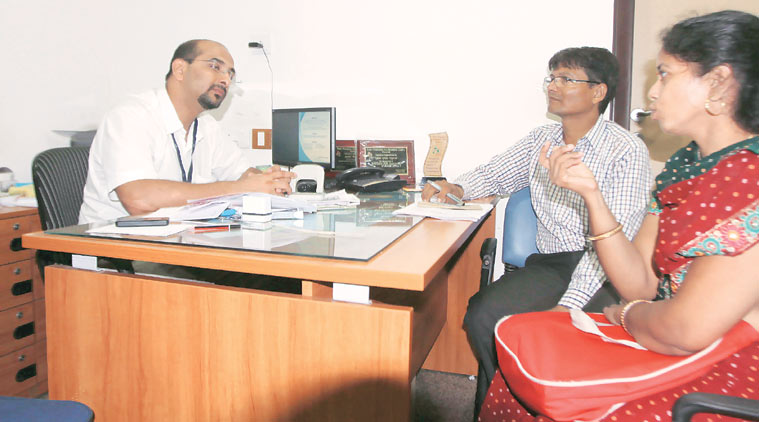- India
- International
Heart to heart
From convincing families to dealing with police, officials and arranging funds, Kulkarni does it all.
 Aniruddh Kulkarni counselling a family in his room. (Source: Express photo by Deepak Joshi)
Aniruddh Kulkarni counselling a family in his room. (Source: Express photo by Deepak Joshi)
It is 12.45, close to lunch time, and a queue of people is waiting expectantly outside a tiny office on the second floor of Jupiter Hospital in Thane, a north Mumbai suburb. Inside, Aniruddh Kulkarni, 37, sits across a table, two mobile phones glued to his ears, reeling out rapid instructions. As transplant coordinator of the hospital, he is responsible for managing organ transplants, a job that involves working with different sets of people — patients, donors, government departments and the police.
At 1 pm, a patient who needs a kidney transplant visits his office and Kulkarni spends the next hour counselling him. He continues to multi-task — answering phone calls, scrutinising documents — while listening to the visitor’s plea for financial assistance. “A recipient has to sometimes shell out Rs 25 lakh for a transplant. I will have to find an NGO that can give funds,” he says.
At times, the waiting list gets in the way. Like it did for Lucknow’s Santosh Kumar, who died on July 7 waiting for a kidney transplant, despite getting Rs 2.17 lakh from the Prime Minister’s Office for his surgery.
Kulkarni’s day usually begins at 6 am at his home in Mulund, a suburb in north-east Mumbai. Getting his son Siddhesh ready for school tops the day’s agenda. “And then the calls begin,” he signs. While still juggling calls from home, he gets to work a little after 9 am, by which time there’s almost always a long queue of patients and relatives outside his room. “While the demand for organ transplant is high, the process is difficult,” says Kulkarni.
Besides convincing donors, he has to personally monitor each transplant, prepare documents, reach out to the police for no-objection certificates (NOC), keep the state Zonal Transplant Coordination Centre (ZTCC) in the loop and do the rounds of the Directorate of Medical Education and Research for permissions. “The police NOC is hard to get,” he says, as a relative of a patient calls up complaining about the NOC.

Kulkarni steals a glance at his watch — it’s 3 pm and he hasn’t had lunch yet. By 4.30 pm, he has sorted another patient’s papers, neatly pasting 10 photographs on different documents.
Today, he says, is one of the easier days. His office timings are 9 am to 5.30 pm. But his work gets over only by 8 pm, when finally there’s no one outside his cabin. On days that he has to handle a cadaver donation, he spends up to two days running around in the hospital. Sleep, of course, is out of the question.
“In cadaver transplants, we retrieve organs from someone whose brain has stopped functioning but the heart continues to beat,” explains Kulkarni, who has been doing this job for over seven years now.
Often this involves fending off hostile relatives. “They ask all kinds of questions — ‘Why are you forcing us?’, ‘We want to talk to the recipient’s family’, ‘Are you doing this for profit?’,” says the post-graduate in social work and hospital administration.
Since 2011, there have been over 50 cadaver deaths in the hospital. He has convinced relatives of 23 of them to donate organs. In a city that has never had a single successful heart transplant, he has even succeeded in getting two heart donations, though both the transplants failed. Certificates from ZTCC sit proudly on his table as proof of Kulkarni’s persuasive skills.
Detailing the procedure for cadaver donation, he says, “Usually the ICU calls me when they have a brain-dead patient. My work starts from there.” By 12.30 pm, he gathers past case-papers of transplants and heads towards the ICU. Then begins the unpleasant bit of talking to the family. “Asking them for organs is harder than informing them about the death. For them, it’s like another blow.”
It is only by 3 pm that the doctors conduct tests to confirm brain death. Kulkarni then informs the ZTCC to identify recipients for transplant from their waiting list, sends documents to the Directorate of Medical Education and Research (DMER), approaches the police for permissions, and finally looks for financial assistance.
“The actual transplant begins only by midnight and the surgery goes on through the night,” says Kulkarni, who stays on till the end. In some cases, he even accompanies the family to the post-mortem centre and helps them till the body is handed over. He gets home only by evening the following day.
Back in his office, Kulkarni pulls out two passport-sized photographs from his wallet — one of a nine-year-old boy and the other a six-year-old girl. The girl was declared brain dead on February 16, 2014, when she slipped into coma. An entire team together explained to the parents how “their girl can live on in someone else’s body”.
Two days later, the father of the nine-year-old boy walked into his office and said, “My son has cerebral palsy. I want to donate all possible organs.” Kulkarni was touched deeply. “I am the father of a seven-year-old,” he sighs, putting the photographs back.
Apr 19: Latest News
- 01
- 02
- 03
- 04
- 05






































